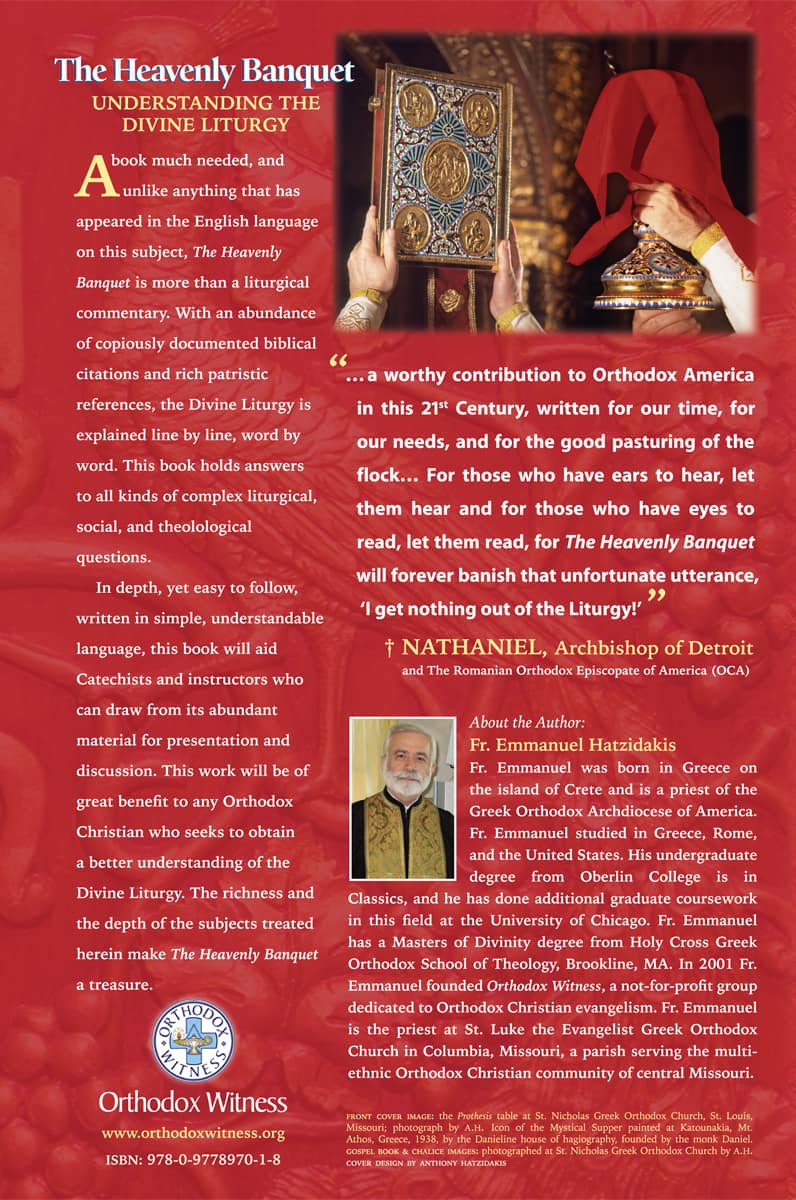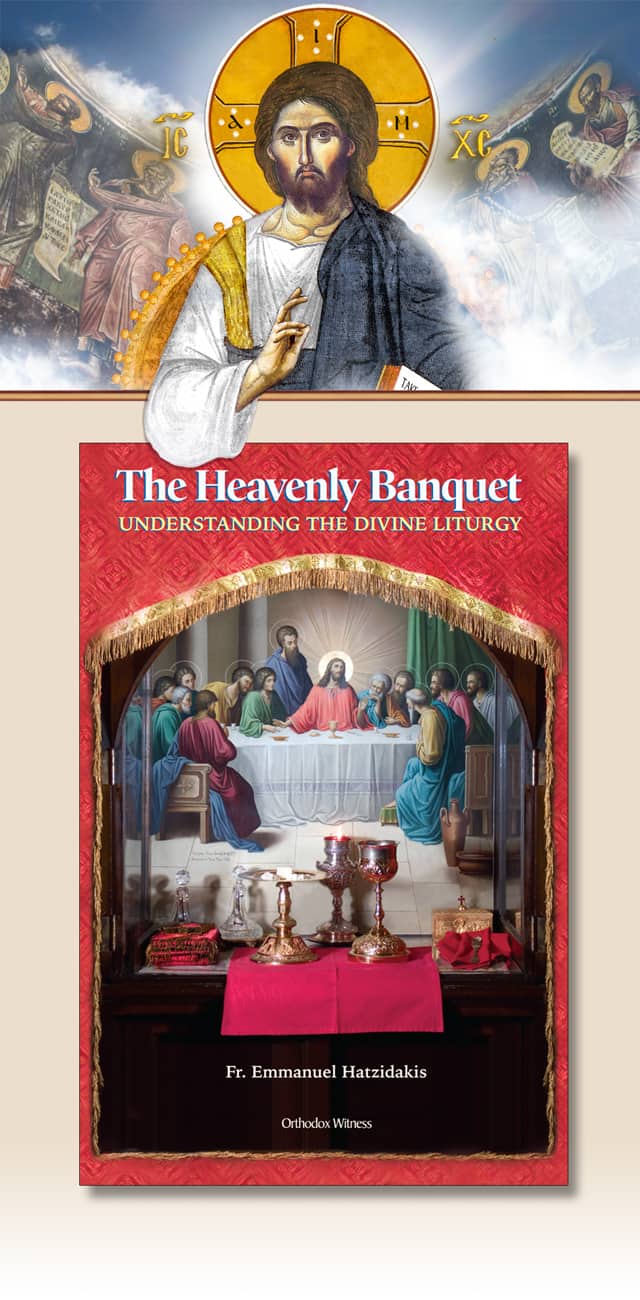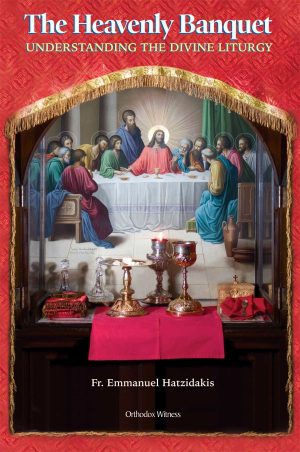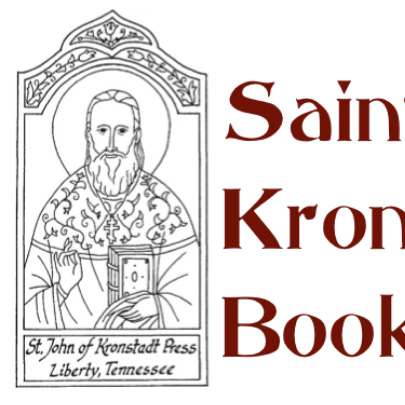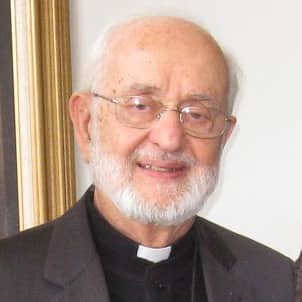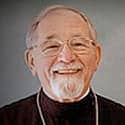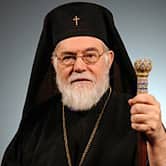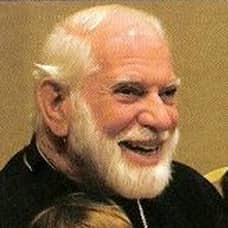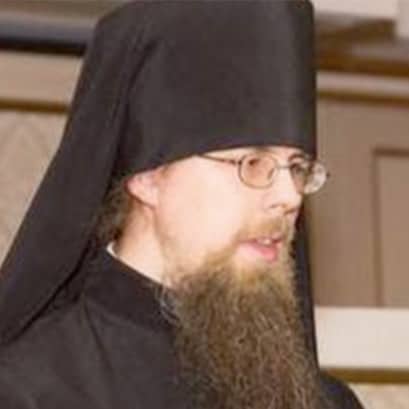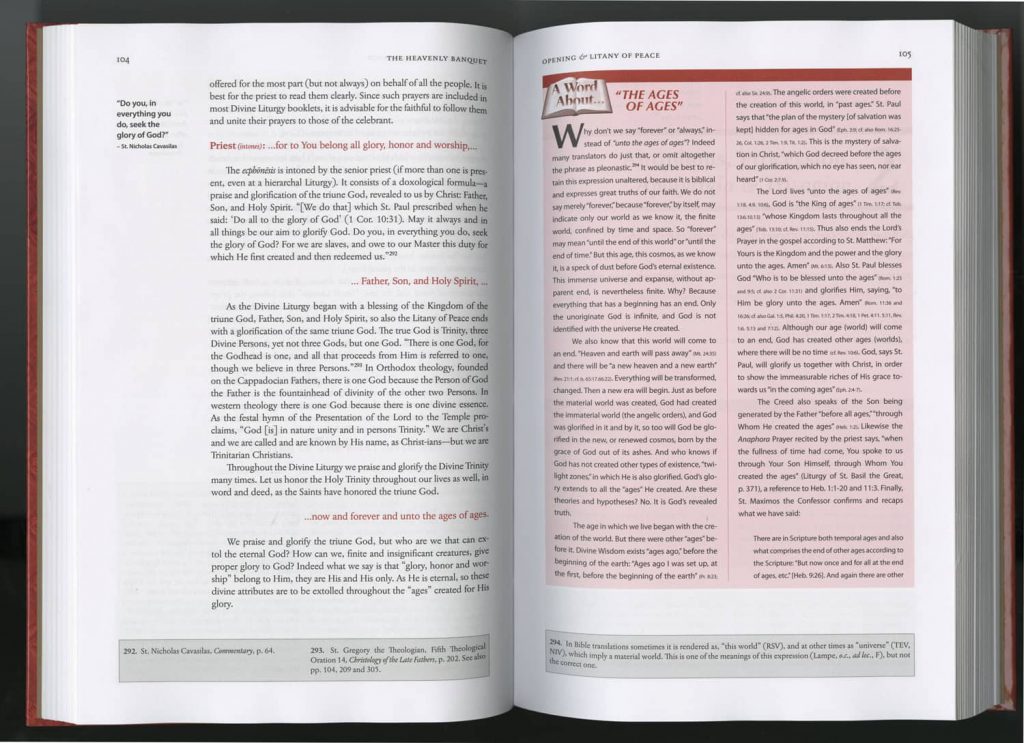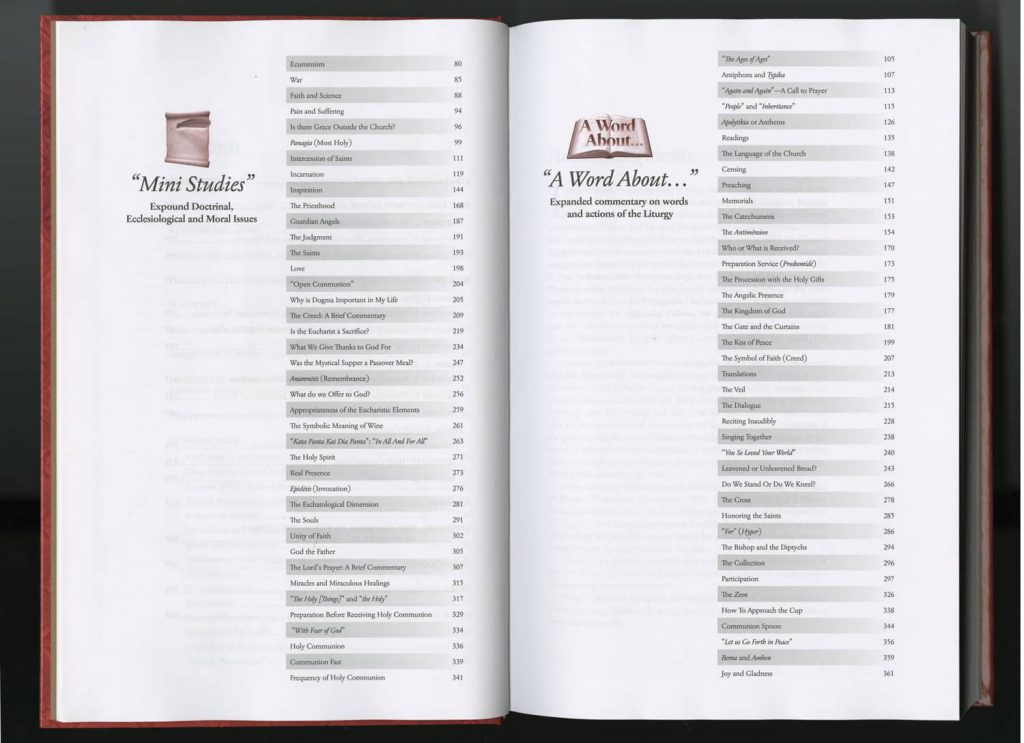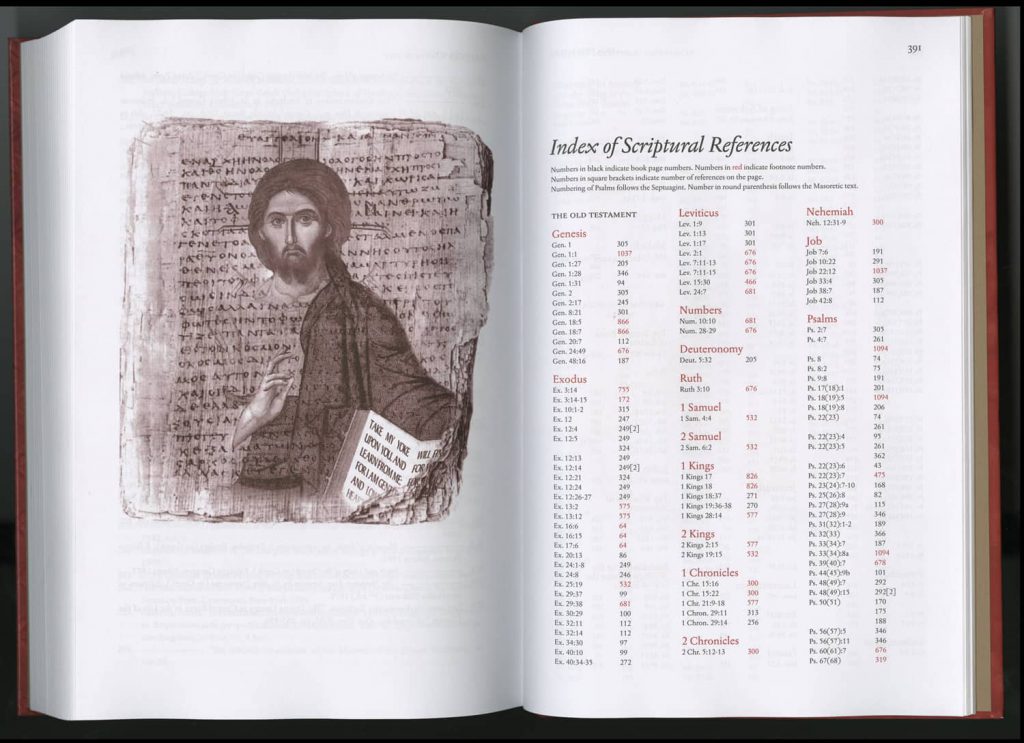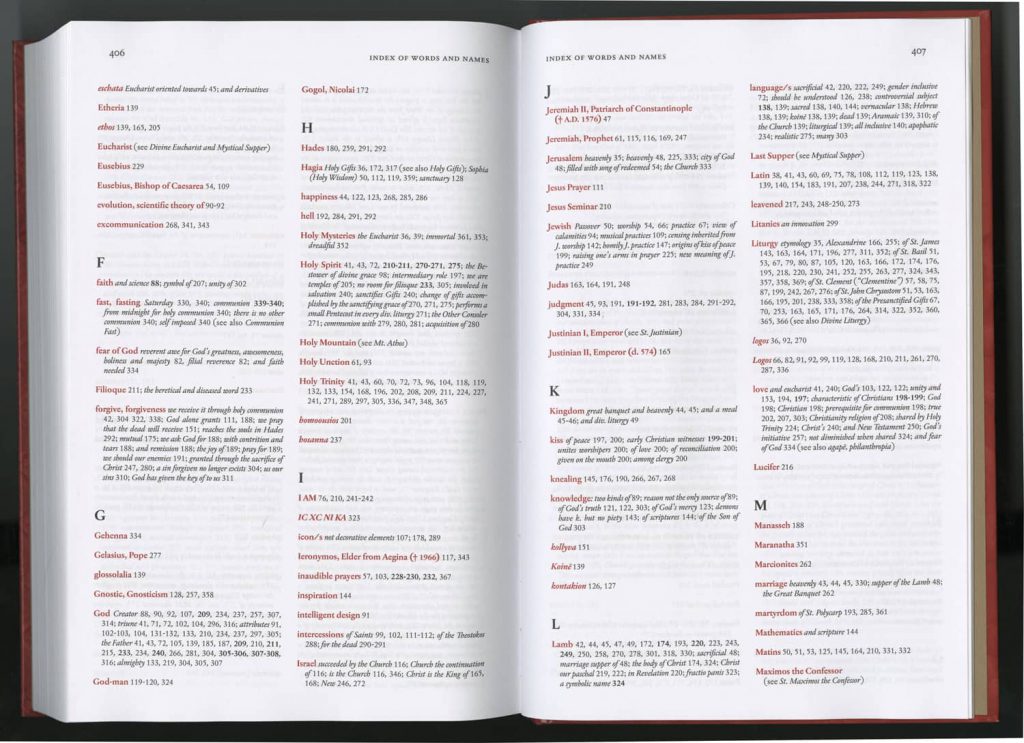The Heavenly Banquet
Understanding the Divine Liturgy
by Fr. Emmanuel Hatzidakis
The Heavenly Banquet addresses head-on not only liturgical matters, but also social, moral and doctrinal issues, always in a clear, practical, informational, and uplifting way. In depth, yet easy to follow, written in simple, understandable language, this book will aid Catechists and instructors who can draw from its abundant material for presentation and discussion. This work will be of great benefit to any Orthodox Christian who wants to obtain a better understanding of the Divine Liturgy.
“A gem for all Orthodox Christians.”
–Saint John of Kronstadt Press
“All you will ever want to know about the liturgy—and more—is offered to you in this one volume.”
—Light and Life Publishing
“I am certain the reader will be edified by your work, which shows long and tedious study of the material as indicated by the extensive bibliography.”
– Fr. Alkiviadis Calivas
“It’s a spectacular book not only in what he himself [Fr. Emmanuel] comments, but all the glossary that’s there, the bibliography that’s there, all the quotations of the Church Fathers and modern writers that are there. It’s just totally awesome.”
— The late Fr. Thomas Hopko, (speaking about The Heavenly Banquet for 3 minutes on his Ancient Faith podcast.)
“Certainly the Lord was with you as you worked to make sure that no one can any longer say, ‘I don’t get anything from the Liturgy!’”
+ Nathaniel, Archbishop of Detroit (OCA)
“Father Emmanuel’s work should be admired for its breadth and depth, as well as the assistance it will bring to all those who seek to enhance their participation in the Holy Eucharist. We thank him with our paternal blessings on this endeavor, with our prayers for its good use among the faithful.”
+ The late Metropolitan Iakovos of Chicago (GOARCH)
“...[The Heavenly Banquet] is written from a perspective well-informed both historically and theologically, and it includes a vast array of notes containing much data not otherwise available in English, with ample citations (often to contemporary Greek works).”
–Hieromonk Herman (Majkrzak), “The Little Entrance in History, Interpretation, and Practice”
Sample layout page showing main text, footnotes and “A Word About” study.
Studies contents page. THB includes 80 studies throughout the book.
Scripture reference index
Words and names index
By reading the Introduction alone, one is introduced into the inexhaustible riches of the Divine Liturgy. But THB goes on, in its more than 300 dense pages that follow, to provide answers to a multiplicity of questions. For example:
Why do we pray for our armed forces? The question leads to a brief examination of the issue of war. The petition, For favorable weather leads to an exploration of the issue of God’s involvement in the world. Praying for the dead leads to a study on the souls, remembering the bishop leads to a brief study of the bishop’s role in the Church, calling God Father leads to an excursion on the first person of the Holy Trinity, and praying for healing leads to a study on miracles. Many other issues are addressed in a similar fashion, including suffering, grace, intercession and veneration of saints, inspiration, judgment, open communion, significance of dogma, and so on.
The commentary examines in depth certain crucial issues, such as:
- Why do we pay such a great honor to the species of bread and wine carried in procession before their consecration (Great Entrance)?
- Why do we use bread and wine?
- Was the Mystical Supper a Passover meal?
- Is the Eucharist a sacrifice?
- What is the significance of “remembering” the Lord’s command “Do this”?
- What do we offer to God?
- What exactly is taking place when we gather together to offer and partake of Christ in the Eucharist?
- What is the ultimate purpose for offering God the Divine Liturgy?
The commentary returns to a few points with persistence. Active and joyful participation by the people stands out—participation through a fuller comprehension, by joining in the singing, by praying and, especially, through participation in the holy sacraments. The commentary insists that the so-called secret prayers be read out loud. Another important point stressed by the book is a joyful participation in the celebration of the Divine Liturgy.
THB opens new vistas, offering an eschatological perspective of the Eucharistic Mystery, and a renewed call for regular participation of the Eucharist. It contains extensive sections on how to prepare for Holy Communion, on how frequently to approach, it provides guidance on Communion fasting, and an explanation of the great mystery and what it does to those who partake of it.
The commentary does not balk at addressing difficult and controversial issues:
- Is there grace outside the Church?
- What is ecumenism?
- Should we have “open communion” with non-Orthodox Christians?
- Why do we insist on dogma?
- What is the relationship of faith and science?
- What is the role of the Theotokos in the Church?
- How do the Saints intercede for our salvation?
Follow THB and the Divine Liturgy won’t be boring to you ever again. THB will help you pray with understanding, with meaning, with fervor, with spiritual joy.
Reviews
- Book review by Fr. Thomas Hopko
- The Word Magazine (Antiochian Archdiocese) April, 2010.
- Fr. Doug Papulis and Fr. Michael Arbanas, St. Nicholas Greek Orthodox Church, St. Louis, Missouri
- Catholic Library World magazine.

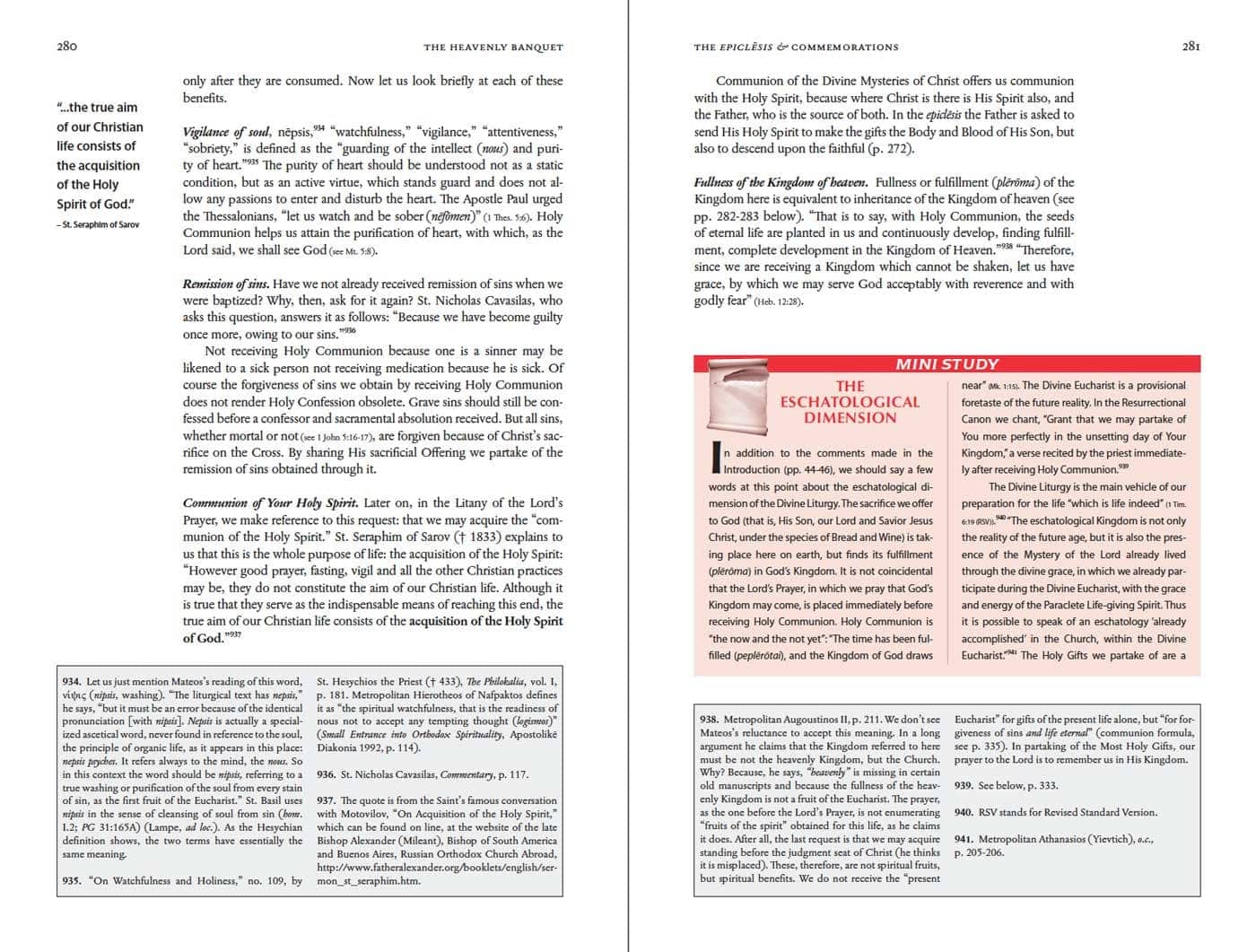
FEATURES
- 80 Special Topic Studies (40 "Mini Studies" & 40 "A Word About" studies)
- A self-contained extensive Introduction
- The complete Divine Liturgy text, indexed for quick reference
- Thorough, detailed Index of words and names
- Color-coded Index of all Biblical citations
- Parallel Biblical accounts of the institution of the Eucharist
- The complete Anaphora from the Divine Liturgy of St. Basil the Great
- 1281 footnotes
- 305 bibliographical sources
Read an interview for Come Receive the Light with Fr. Chris Metropoulos and the author of The Heavenly Banquet, Fr. Emmanuel Hatzidakis.
